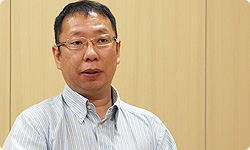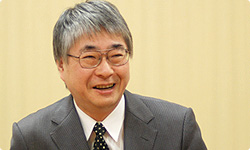9. Sucked Into The Development Process
I have the impression that the three of you were very deeply involved in the development process for New Super Mario Bros. Wii and that you worked on it for a very long time.
Right.
Nakago-san’s role has always been to be the first person to point out: “This could be a big problem!” (laughs)
That’s right! (laughs)
When I join you for lunch, I can get a sense of how the development process is going by taking note of when Nakago-san comes out with his line: “This could be a big problem!” Judging from that, I could tell that the depth of your involvement in this project had developed into something different from the usual. Could you tell me a little bit more about that?
Well, I’m not quite sure where to start! (laughs) Mario is a huge title, so the people in charge feel a heavy burden of responsibility.
Right. We’re always going to be conscious that we’re shouldering the burden of expectation that comes with one of the company’s flagship titles.
That’s why we feel we have to give it our all and do a solid job so that everyone is satisfied with the results.
So everyone is quite fired-up.
That’s right. Everyone also has their own sense of pride and they're determined to add new elements to the game.
Right.
But while there is that desire, these new elements don’t tend to work out very well.
There’s absolutely no guarantee that just because something is new, it will work successfully. That’s something we can say from experience.

Up to now, you must have tried out a huge number of new ideas. But only those ones that made the grade remain and can be found in Mario titles.
That's right. So even if you come up with a novel idea, you can’t expect it to be used in the game right away. If you stick lots of memos and notes around your desk, you might just see it actually appear in the game after twenty years or so. (laughs)
(laughs)
After all, you can’t expect something that might have taken you just a month to think of to turn into something amazing overnight.
In fact, hardly any ideas end up turning into something amazing.
Right, hardly any do. That’s why, when it comes to new ideas, we tend to put a dampener on things.
You put a dampener on things? (laughs)
I think that putting a dampener on things is the role that the three of us have to perform.
So in other words, you have to take a step back and overlook the development process in a calm, collected manner.
Right. The people in the dev team who are in charge are going to be really fired up, and when you gather people like that together, things can get out of hand. In that situation, you need someone forceful to keep a lid on things and bring everyone into line. That's basically what we're there for. (laughs) This was especially the case this time round with New Super Mario Bros. Wii. There really needed to be someone there to make final decisions about the features to be included in the game.
So this time all three of you needed to be deeply involved in the title’s development. Whereas usually you might just be overseeing the dev team, this time you were actually involved in a hands-on way. So from my point of view, I thought: “That looks really tough!”
But we enjoyed doing it!
Well, that’s true. You did look like you were enjoying yourselves! (laughs)
We really were! (laughs)
So you might be saying how terrible things were, but actually it looked like you were having a great time.
Yes, we’d be laughing while we said: “Things are so tough!” (laughs)
So what was Miyamoto-san like when he was with the dev team?
This was the first time in a long time that he’s actually come to the coal face of the development process, dropping in on the programmers at SRD.
Yes, that’s right.
He’d come in late at night and stand behind the programmers with his arms crossed, just watching them for what seemed like hours. He'd say things like: "Can't you make it a little more like that?" At times like that, I didn't dare approach him because he was in a world of his own. (laughs)

(laughter)
But he has no choice - that's what he has to do! (laughs) But the fact that, even after twenty-five years, he can maintain that level of involvement may be the secret of why Mario titles are so enjoyable.
Well, I think that from now on we’re going to have to stop looking over the dev team’s shoulders because once you look at how development is progressing, you’re always going to end up entering more and more deeply into the process.
I don't think that's quite the right way of putting it.
You don’t?
Well, you used the phrase “entering the process”. I don’t think you enter it; I think that you get sucked into it.
(laughter)
So even though it should be sufficient to tell the dev team what to do and leave them to get on with it, you’ll go there and end up saying: “Do this! Do that!” Then you’re somehow sucked into it.
Hmmm… I wonder…
When you use the word “enter”, it sounds like you’ve coolly considered the situation and are getting involved in the development process because you feel strongly that it’s necessary. But from my perspective, that isn't how it looks.
You’re right. We might be having a meeting separately from the dev team when Tezuka-san will suddenly stand up and pop into the development area, saying: “I think I’d better just mention this to them.”
And you think that’s being “sucked in”?
Yes, I think that’s what it is! (laughs)
Well, it's a fine thing to find a job that you can get sucked into.
Yes, it really is a fine thing.
Of course, you don’t tend to get many holidays, but at the same time you can sense that aura, that feeling that you’re doing something worthwhile.
(laughs)
So you’re basically being sucked in because you enjoy it, right?
Ah, is that right? Well, I enjoy what I do, so I guess I do end up being sucked into it. (laughs)
